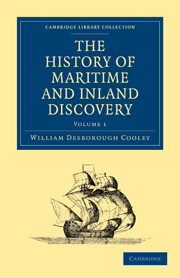Book contents
- Frontmatter
- Contents
- BOOK I GEOGRAPHY OF THE ANCIENTS
- CHAP. I
- CHAP. II THE GREEKS. — HOMERIC AGE
- CHAP. III GREEKS CONTINUED.—HISTORIC AGE
- CHAP. IV THE GREEKS CONTINUED
- CHAP. V GREEKS CONTINUED
- CHAP. VI THE GREEKS CONTINUED
- CHAP. VII DISCOVERY OF THE MONSOONS
- CHAP. VIII PTOLEMY
- CHAP. IX ON THE COMMERCE OP THE ANCIENTS
- CHAP. X MYTHIC GEOGRAPHY OP THE HINDOOS, AND ITS CONNECTION WITH GRECIAN MYTHS
- BOOK II GEOGRAPHY OF THE MIDDLE AGES
- BOOK III PROGRESS OF GEOGRAPHY IN THE MIDDLE AGES
CHAP. III - GREEKS CONTINUED.—HISTORIC AGE
Published online by Cambridge University Press: 05 July 2011
- Frontmatter
- Contents
- BOOK I GEOGRAPHY OF THE ANCIENTS
- CHAP. I
- CHAP. II THE GREEKS. — HOMERIC AGE
- CHAP. III GREEKS CONTINUED.—HISTORIC AGE
- CHAP. IV THE GREEKS CONTINUED
- CHAP. V GREEKS CONTINUED
- CHAP. VI THE GREEKS CONTINUED
- CHAP. VII DISCOVERY OF THE MONSOONS
- CHAP. VIII PTOLEMY
- CHAP. IX ON THE COMMERCE OP THE ANCIENTS
- CHAP. X MYTHIC GEOGRAPHY OP THE HINDOOS, AND ITS CONNECTION WITH GRECIAN MYTHS
- BOOK II GEOGRAPHY OF THE MIDDLE AGES
- BOOK III PROGRESS OF GEOGRAPHY IN THE MIDDLE AGES
Summary
While the poets of Greece perpetuated the memory of those happy regions of the West where innocence and contentment were supposed still to exist unalloyed, it was the occupation of Grecian philosophers to devise cosmological systems equally remote from truth and reality, and not unfrequently drawn, perhaps, from the same ample stores of Indian mythology. Brilliant fictions and daring hypotheses are, perhaps, the natural precursors of successful investigation: they serve at least to awaken curiosity; and where the freedom of the human mind is not fettered by the arts of an interested priesthood, even the fancies and extravagancies of active intellect make some progress towards the discovery of truth.
Thales (600 B. C.) taught the sphericity of the earth; but Anaximander, his disciple, compared it to a cylinder; Leucippus gave it the shape of a drum; others preferred the cubic form; and some, following Xeno-phanes and Anaximenes, believed it to be a high mountain, the base of which has an infinite extension, while the stars float round its summit. Heraclides, again, differing from the others, taught that the earth has the figure of a ship. These doctrines are all but repetitions of those taught by the different Indian sects, who assign to the earth the figure, or rather figures, of Mount Meru, and that of the mysterious ship Arghe. The Greeks may be excused for believing absurdities taught with so much solemnity, and surrounded with such an apparatus of learning.
- Type
- Chapter
- Information
- The History of Maritime and Inland Discovery , pp. 26 - 45Publisher: Cambridge University PressPrint publication year: 2010First published in: 1830



